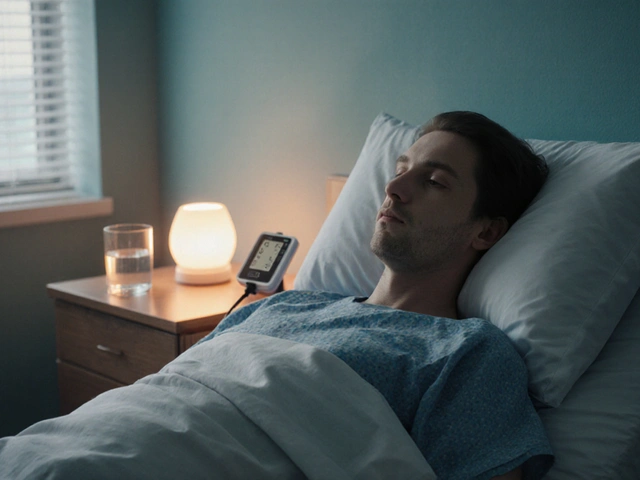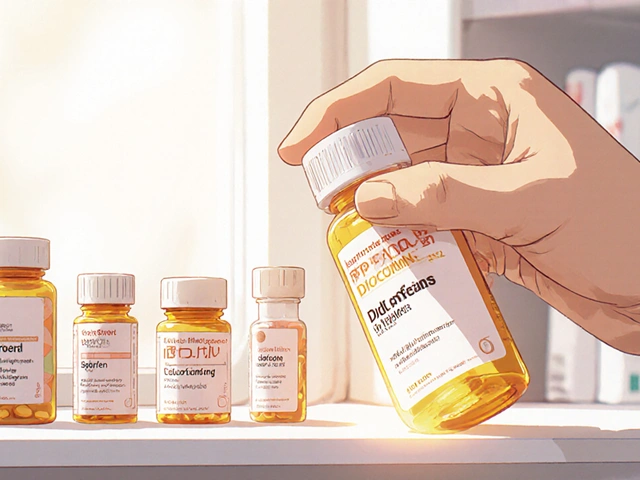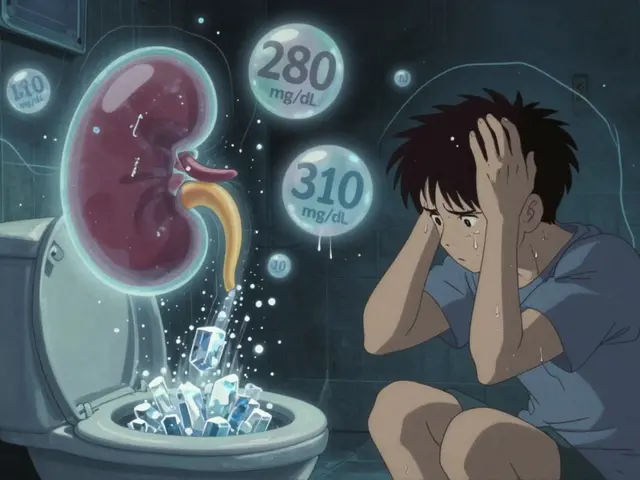When you're stuffed up from a cold or allergies, it's tempting to grab a decongestant. You want to breathe easier, sleep better, get back to normal. But if you have heart disease or high blood pressure, that little pill or spray might be doing more harm than good. Decongestants like pseudoephedrine and phenylephrine aren't just clearing your nose-they're tightening blood vessels all over your body, including around your heart. And that can trigger serious problems.
How Decongestants Work (and Why They're Risky for Your Heart)
Decongestants work by narrowing blood vessels. That's why they reduce swelling in your nasal passages-you're cutting off the extra blood flow that causes congestion. But this same effect doesn't stay in your nose. The medicine enters your bloodstream and tightens vessels everywhere, including those feeding your heart and brain.
This is where things get dangerous. When blood vessels constrict, your blood pressure rises. For someone with healthy arteries, a small bump in pressure might not matter. But for someone with heart disease, uncontrolled hypertension, or a history of stroke or heart attack, that rise can be the difference between feeling under the weather and ending up in the emergency room.
Studies show that even standard doses of oral decongestants like pseudoephedrine can raise systolic blood pressure by 2 to 5 mm Hg. That might sound small, but in someone with already elevated pressure, it can push levels into dangerous territory. In one documented case, a 5-year-old girl developed high blood pressure after taking phenylephrine at the recommended pediatric dose-no other cause was found. Her blood pressure only returned to normal after stopping the medication.
Who’s at the Highest Risk?
Not everyone with heart issues needs to avoid decongestants entirely-but some people absolutely should. Medical experts agree on four high-risk groups:
- People with uncontrolled high blood pressure-even a slight rise can lead to a stroke or heart attack
- Those with heart failure-decongestants make the heart work harder, which can trigger fluid buildup and worsening symptoms
- Patients with arrhythmias-decongestants can trigger irregular heartbeats, including dangerous ones like ventricular tachycardia
- People with Prinzmetal angina-a rare condition where coronary arteries spasm, and decongestants can make those spasms worse
The American Heart Association is clear: if you have any of these conditions, avoid oral decongestants. They specifically warn against using pseudoephedrine, phenylephrine, or ephedrine. Even if your blood pressure is "controlled" with medication, experts say the added stress from a decongestant isn’t worth the risk.
Topical Decongestants Aren’t Safer Than You Think
Many people assume nasal sprays like Afrin (oxymetazoline) or naphazoline are safer because they’re applied locally. But that’s a dangerous myth. While these sprays don’t enter the bloodstream as much as pills, they still can-and they’ve been linked to serious heart problems.
A 2015 case report described a 40-year-old man who developed a life-threatening hypertensive crisis and heart failure after using naphazoline nasal spray more than recommended. He didn’t have a prior history of heart disease. The doctors concluded the spray triggered his collapse. This was the first documented case of heart failure directly caused by topical decongestant use.
Another study of 100 patients using oxymetazoline spray for a week found their heart rates increased significantly-even though their blood pressure didn’t rise much. That’s still a red flag. Your heart doesn’t need extra strain, especially when you’re already fighting off an infection.
And here’s the kicker: most nasal spray bottles carry the same warning as oral pills: "Do not use if you have heart disease or high blood pressure." If you’re ignoring that label, you’re taking a gamble with your life.

Why Cold and Flu Alone Are Dangerous Too
It’s not just the decongestant. The illness itself is a stressor. When you have a cold or flu, your body releases inflammatory chemicals, your heart rate goes up, and your blood vessels tense up. All of this puts extra pressure on your cardiovascular system.
A 2017 study of nearly 10,000 people hospitalized for heart attacks found that those who got a respiratory infection were more than three times as likely to have another heart attack within a week. And if they took NSAIDs (like ibuprofen) or decongestants during that time, the risk went even higher.
So even if you skip the decongestant, being sick is hard on your heart. That’s why experts say the best strategy isn’t just avoiding certain meds-it’s avoiding the need for them in the first place.
What You Can Use Instead
You don’t need decongestants to feel better. There are safer, effective alternatives that won’t raise your blood pressure or stress your heart:
- Saline nasal sprays-these just flush out mucus and irritants with salt water. No side effects. No risks.
- Humidifiers-adding moisture to the air helps loosen congestion naturally
- Guaifenesin (Mucinex)-this expectorant helps thin mucus so you can cough it up. It doesn’t constrict blood vessels.
- Steam inhalation-breathe in warm, moist air from a bowl or shower to open nasal passages
- Rest and hydration-your body heals faster when it’s not fighting dehydration or exhaustion
The European Journal of General Medicine puts it bluntly: "These decongestant agents give only symptomatic relief and they don’t treat flu and allergic disease. For this reason, if the symptoms are mild or moderate, not using these agents will be more wisely."
That’s the key point. Decongestants don’t cure anything. They just mask symptoms for a few hours. For someone with heart disease, the trade-off isn’t worth it.

What to Do Before You Take Anything
If you have heart disease or high blood pressure, always check with your doctor or pharmacist before taking any cold medicine. Even if it says "non-drowsy" or "for sensitive stomachs," look for hidden decongestants.
Pseudoephedrine is now kept behind the pharmacy counter because pharmacists are trained to screen for risks. They’ll ask you if you have high blood pressure, heart disease, or take certain medications. Don’t skip this step. That question exists because people have died from ignoring it.
Read every label. Look for these words: pseudoephedrine, phenylephrine, ephedrine, oxymetazoline, naphazoline. If you see them, put the product down. Choose products labeled "for high blood pressure" or "decongestant-free."
Bottom Line: Your Heart Comes First
Decongestants might give you quick relief, but they come with hidden costs-especially if your heart is already under strain. The rise in blood pressure, the added stress on your heart, the risk of arrhythmias or heart failure-it’s not a small trade-off. It’s a life-threatening one.
The best way to protect your heart during cold season isn’t to find a "safer" decongestant. It’s to avoid them entirely. Use saline sprays, humidifiers, rest, and hydration. Let your body heal naturally. If your symptoms are severe or last more than a week, talk to your doctor. There are safe ways to manage congestion without risking your heart.
It’s not about being overly cautious. It’s about being smart. Your heart has carried you this far. Don’t let a cold medicine push it too far.









i just use saline spray now and honestly i feel better without the buzz
no more racing heart after a cold
why risk it when nature works just fine?
this is why america is weak. in india we take anything that works. if your heart is weak then dont be lazy and go outside and walk. medicine is for cowards.
wait so phenylephrine is bad but guaifenesin is ok? but i read somewhere that guaifenesin can cause kidney issues if you overdo it like 5000mg a day which is like 10 pills so dont be dumb and dont overdo it ok
you know what’s truly tragic? the fact that we’ve reduced human resilience to a pharmacological equation. we’ve forgotten how to breathe through discomfort, how to sit with the quiet ache of congestion as if it were a meditation. decongestants aren’t just chemical intrusions-they’re metaphors for our collective refusal to be still. and yet, we reach for them like pacifiers, as if our bodies were broken machines that needed tuning rather than sacred vessels that needed rest. the real epidemic isn’t the cold-it’s our spiritual exhaustion.
this article is just fearmongering. i take pseudoephedrine every winter and my bp is fine. doctors are just trying to sell you more pills. stop listening to them
good info here. if you’ve got heart issues just stick to the saline and steam. i used to take decongestants too until my dad had a scare. now i just breathe slow and drink tea. simple stuff works.
i had no idea nasal sprays could do this
used afrin for years thought it was harmless
now i just use a humidifier and sleep with an extra pillow
life changed
this is why you talk to your pharmacist.
i used to think decongestants were magic
then i had a heart scare at 42
now i use a neti pot and cry in the shower
it’s not glamorous but it keeps me alive
the american heart association is a corporate shill. they’re funded by pharmaceuticals that profit off your fear. saline sprays are for peasants. if you’re truly at risk you should be on beta-blockers anyway-this is just distraction medicine masquerading as wisdom.
this is the kind of post that saves lives
thank you for writing it
my grandma passed because she didn’t know
now i tell everyone i know
you’re doing good work